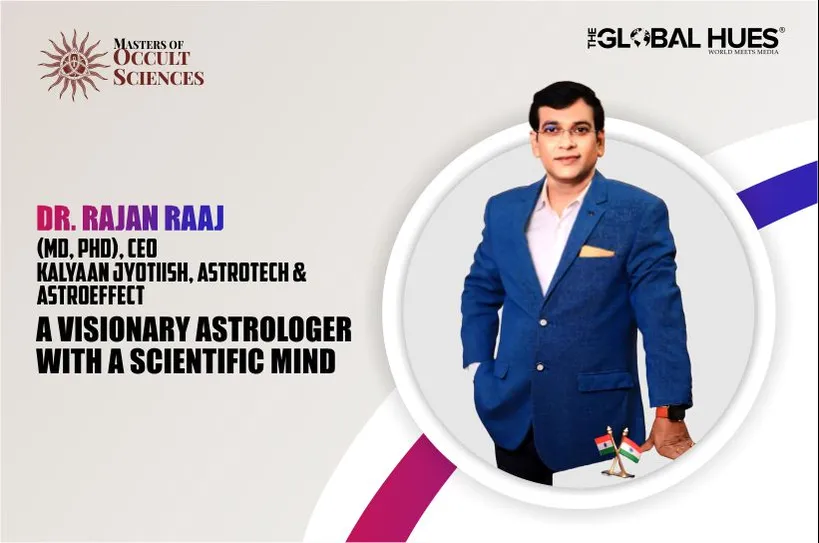“Astrology is a science of doing action in a proper direction.”
Dr. Rajan Raaj (MD, PhD), CEO Kalyaan Jyotiish, Astrotech & AstroEffect)
We often say that predictions hold key to the future, yet some perceive them as mere superstitions. Why?
Despite being questioned and suppressed through centuries, the ancient science of astrology continues to thrive because of renowned revivalists like Dr. Rajan Raaj. A missionary who devotes himself to restoring this ancient science and highlighting its relevance time and again in the present.

Astrology has deep roots in Indian history. The ancient science has been a source of wisdom for kings and commoners alike, influencing political strategies, agricultural practices and even personal relationships. It is often believed that astrology connects the past and present, offering timeless wisdom to guide and enlighten future generations.
With every knowledge system, there is always a past, present and future. Astrology is almost 5000 years old. Its history showcases how invaders tried to destroy important texts and Britishers tried to manipulate the ancient texts and exploit them to suit their needs.
In a candid chat with one of the revivalists of this ancient system, Dr. Rajan Raaj shares his mission to educate people about the rich history of astrology. He envisions to show how astrology has always been a scientific practice that helps millions of people face challenges head-on.
Dr. Rajan is a renowned revivalist serving mankind for over 15 years. He always associates astrology with modern streams of science. He is an astrologer from Patna and was born & brought up in the Siwan district. Dr. Rajan holds multiple degrees, including an M.D. (A.Medicine), PhD (Astrology), PhD (Yogic Science & Diabetes) and Gemologist (I.D.I) Govt. of India, Gold Medal winner. He has also been a lyricist in the film industry, which is his passion. The first song written by him was sung by the celebrated artists Kumar Sanu and Jaspinder Narula.
Q1. How have historical events and shifts in education impacted the practice and perception of astrology over time?
In my view, Indian society is split into two groups when it comes to Astrology: Believers and Non-believers. The ratio between these sections often varies, sometimes 70:30, 60:40, or 50:50. Today, people have a materialistic or scientific worldview. Suffering from negative experiences and not succeeding in life even when they are talented, often turn people into believers in astrology. They connect these issues to supernatural energies and name them ‘God’ or ‘Destiny.’
Let’s try to understand the historical and cultural context of this belief. In Indian culture, Vedas are ancient religious texts and astrology is a part of these texts. These invaluable texts were well-preserved in the libraries of Nalanda University, which was home to nine million books and attracted students from around the world. The University offered subjects like Medicine, Surgery, Ayurveda and Astrology, to name a few, thereby, making it a distinguished centre of learning in ancient times.

However, the sacred centre of learning was attacked by Bakhtiyar Khilji, a Turko-Afghan military general of the Gurid ruler Muhammad of Ghor. Once, he had fallen ill, he summoned a vaidya named Rahul Sri Bhadra. Yet, Khilji refused treatment from Rahul because he was a Buddhist monk. When Khilji’s health worsened, he was willing to accept a cure from Rahul, if it didn’t involve any medicine.
The vaidya, understanding the gravity of the situation, devised a clever plan. He coated the pages of the Quran with medicine, knowing that Khilji reads it daily. As Khilji turned the pages, he would lick his fingers, unknowingly ingesting the medicine. Slowly, Khilji’s health improved. Jealous and insecure by India’s rich history in Ayurveda, Khilji burned the Nalanda University in 1199.
According to historical accounts, Khilji and his forces invaded the university, setting fire to various buildings, destroying the library and killing scholars and monks who resided there. This pattern continued with others who invaded India. They also destroyed temples and ancient institutions, which led to the destruction of ancient and invaluable texts that were preserved and developed over centuries.
The pattern continued with Aurangzeb, once he became the King. He issued a decree that no one would possess Hindu scriptures–Geeta and didn’t allow people to perform any type of poojas. Those who violated the rule faced life imprisonment or were hanged. As a result, many pandits lost their livelihoods. Many old astrologers died, others who didn’t bow down to the decree left the country and the rest chose to convert to avoid punishment.
Q2. How did the arrival of the British in India affect the tradition and teachings of astrology?
The Britishers arrived in the early 17th century as traders who wanted to seek profit through the lucrative spice trade. Over time, they established trading posts and forts along the coastlines. Subsequently, they took advantage of the internal divisions in India and used their superior military technology to take control of the country.
During Thomas Babington Macaulay’s time in India, there was widespread interference in religious texts. Scholars were encouraged to change, distort and manipulate verses. Gurukul schooling was taken over by convent schooling and the focus shifted to English education and teaching the values of the Bible. This shift caused a notable decline in the study of Vedas and Sanskrit, thereby eroding the essence of the Indian culture.
Q3. In the modern era, how can the integration of ancient wisdom, like astrology, with modern scientific advancements enhance our understanding of human experiences and provide meaningful guidance?
Astrology still plays a significant role in guiding people and offering insights into their lives. However, it faces challenges in today’s world. The decline in the Indian education system has carried into the present. There are several instances of talented individuals seeking opportunities in foreign countries leading to a brain drain.
As English has now become a part of the school curriculum across the nation, it is pushing Sanskrit and other ancient languages to obscurity. The early British attitude towards Ayurveda, Unani and folk medicine was often tolerant and appreciative. Yet due to the Western-influenced education system, inherited by Lord Macaulay, all traditional wisdom including Ayurveda became unscientific and inferior.
I believe that Brahma’s writing is fundamental, but to alleviate human suffering, he made astrology accessible through the Vedas. Today, almost everyone is engaged in some form of karma, but where they end up depends on their choices. Despite significant advancements in science and technology, confusion and dissatisfaction still prevail. Astrology can provide valuable guidance in navigating these challenges, offering meaningful insights to help society.
Even though astrology has suffered a lot, many dedicated researchers continue to explore and advance this science, guiding various aspects of life such as children’s progress, career success, health, wealth and more. Astrology can accurately predict 80% to 90% of these life events and offer solutions.
I recall the renowned scientist Stephen Hawking who is often compared to Einstein. He once visited India and suggested that if we could precisely track planetary movements, we might predict many future natural events. He believed that astrology could be a valuable tool in this process.
Q4. What are your views on astrology’s role in personal growth and decision-making?
Astrology helps us understand different aspects of our lives by looking at our planetary positions. It reveals details about our personality and gives insights into past and future events. When astrologers make predictions, they focus not on the individual but on the prevailing cosmic situation.

Despite its knowledgeable insights, astrology faces a significant challenge because there is no proper curriculum for it in schools, colleges, or universities. This lack of formal education makes it hard for people to learn astrology, thereby creating an illusion that astrology is only for pandits and not for everyone else. Due to this misconception, people consult astrologers without researching and verifying their expertise.
Fortunately, things are changing for the better. Now, educated people from diverse fields and backgrounds are showing interest in it. However, astrology like any other science operates within certain limitations. It can guide us like a GPS showing possible future events and trends but it cannot promise guaranteed results.
Let’s take the example of medical science, it doesn’t guarantee 100% recovery. Despite advances in treatments and medications, doctors can’t guarantee that a patient will make a full recovery, especially from a serious illness like Cancer. Each person’s treatment is different and there are many issues that doctors cannot control. Astrology is similar to that, it cannot guarantee 100% results.
Q5. What is Medical Astrology?
According to me, Medical Astrology uses astrological charts to assess and predict potential health issues. By analysing your natal chart, it’s possible to foresee potential health problems before they arise. The importance of medical astrology has increased significantly since the COVID-19 pandemic, as people seek more ways to understand and manage their health.
It can also reveal insights about your immune system and overall health. For example, even highly fit individuals, such as athletes, can face serious health challenges, as seen with Yuvraj Singh, an Indian cricketer who battled cancer. Historically, medical astrologers in early modern Europe used this science to guide health practices, and its relevance continues to grow today.
Q6. What is your approach to Vaastu Shastra and how does it integrate with your work in astrology?
My approach to Vaastu Shastra is deeply rooted in understanding ancient principles and their application to contemporary living spaces. I integrate geological, geometrical, geophysical, botanical and celestial aspects into my work, considering the natural magnetic and gravitational forces of the Earth. I believe that every structure whether residential, commercial or religious is a living organism that interacts with cosmic forces.
My extensive research and practical experience, helped me convert many struggling businesses and industrial units into profitable ventures by correcting their Vaastu. I also offer services including palmistry, numerology, gemology and many more.
“With respect to Vaastu, my approach includes thorough site selection, soil testing, optimal placement of rooms and doors and consideration of the natural flow of energy within the building.”
Q7. Does ‘VAASTU’ really work in today’s lifestyle?
Yes, in today’s complex world, where everything from air, water and health is under strain, vaastu plays a crucial role. It helps balance the five elements—Earth, Water, Fire, Air and Space. Vaastu addresses not just physical spaces but also enhances mental and financial well-being. Ancient texts like Rigveda and various treatises highlight vaastu’s importance in construction and living spaces, which aim to improve quality of life.
Astrology and Vaastu are complimentary of each other, they offer a comprehensive approach to creating harmony. While Vaastu focuses on physical space and energy flow, astrology provides insight into individual and cosmic influences. Together, they address both immediate issues and long-term well-being. Vaastu has the ability to transform lives and spaces, thereby benefitting many sectors, including struggling industries.
Q8. Do gemstones really work and how do they affect your karma?
Yes, gemstones do have an impact on your karma, but their effectiveness depends on proper diagnosis by a skilled gemologist and astrologer. In India, it’s rare to find experts who are knowledgeable in gemology and astrology. Many people are not fully aware of the Vedic principles behind wearing gemstones, leading to either incorrect usage or improper application of these principles.
While gemstones cannot completely change your karma, they can act as catalysts to reduce the negative effects of planets and help balance the energies between your body and the universe. Gemstones transmit and transform energy, and their effects have been studied extensively. For example, Dr. Oscar Burner in the USA has measured how gemstones’ radiation influences humans. Just as a copper rod can protect a house from lightning, gemstones can help protect your body from negative planetary influences, reinforcing your body’s energy and helping to create a positive force field.
Q9. According to you, what is the meaning of Corporate Astrology?
I am one of the few people who introduced Corporate Astrology in India. It is a new concept of astrology which deals in studying collective planetary influence on a company’s workforce, branding and overall growth. Examining the planetary alignments that affects employees, corporate astrology can offer valuable insights into strategic planning, management, staffing and team dynamics.
Many prominent business houses in India have adopted corporate astrology and have experienced benefits. For example, Ekta Kapoor, a well-known figure in the television industry, has utilised this methodology to enhance her success. Corporate Astrology helps in forecasting future trends, identifying opportunities, managing high-pressure situations and overseeing key projects, making it a powerful tool for business success.
Q.10 What can astrology do for the betterment of the nation?
According to me, astrology contributes to the betterment of the nation by providing additional insights. Along with looking at a minster’s skills and education, checking their planetary charts can benefit the ministry and the country.
Q11. What are some of your key contributions in astrology?
My journey in astrology began when I faced personal challenges in life and consulted various astrologers in India and abroad. I aim to connect astrology with modern sciences and was rewarded for my efforts with a Gold Medal at an international astrology conference in Kolkata. I have also delivered a lecture on “Nanotechnology in Relation to Astrological Science” in front of many renowned astrologers, central ministers, governors and university vice-chancellors.
I have served in many European countries as a disciple of ‘Maharishi Mahesh Yogi,’ a world-renowned Guru and the “Father of Transcendental Meditation.”
Maharishi Mahesh Yogi is a disciple of His Divinity Swami Brahmananda Saraswati, Shankaracharya of Jyotir Math Himalayas. He wanted to spread the knowledge he gained from his master worldwide. As a result, he started public teachings on the transcendental meditation technique and did a world tour to popularise it. Maharishi Mahesh Yogi founded the simple, natural technique of Transcendental Meditation, which allows anyone to experience and use the source of infinite intelligence and creativity within – the field of pure consciousness.
Along with Maharishi Mahesh Yogi, I am greatly influenced and indebted to Sri Ram Sharma Acharaya, an Indian author and freedom fighter and I am deeply grateful for his blessings and knowledge he imparted.
“His Holiness Maharishi Mahesh Yogi is my Gurudev.”
Dr. Rajan’s Achievements
Some of his predictions include significant events like India’s Prime Minister Narendra Modi coming back to power for a third consecutive term in 2024, COVID-19 predictions, the arrival date of the COVID-19 vaccine, farmer’s protests, Joe Biden becoming America’s next President in 2021 and the dissolution of the Pakistani government, to name a few.

He has been honored with several prestigious awards in recognition of his significant contributions to astrology.
- Received the ‘Astrologer of the Year Award’ from Hema Malini in 2024
- Honored with the “Leading and Most Trusted Astrologer of Bihar” award by Mr. Ronit Roy in 2023
- Received the ‘Global Excellence Awards’ from Anupam Kher in 2022
- Honoured with the ‘Pride of Nation Award’ from Nitin Gadkari in 2022
- Recognised as one of the ‘Top 10 Astrologers’ in 2022
- Received the ‘Global Excellence Awards’ from Madhuri Dixit in 2019




